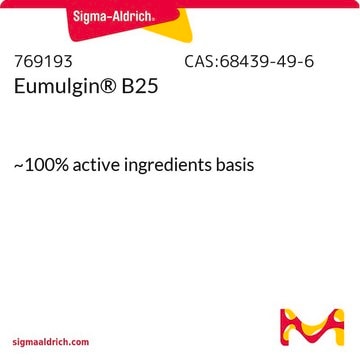8.14727
Brij® 58
for synthesis
Synonim(y):
Brij® 58, Polyoxyethylene (20) cetylether, Polyethyleneglycol (20) cetylether
About This Item
Polecane produkty
Poziom jakości
Postać
solid
siła działania
2500 mg/kg LD50, oral (Rat)
mp
38-42 °C
temp. przejścia
flash point >149 °C
temp. przechowywania
2-30°C
InChI
1S/C56H114O21/c1-2-3-4-5-6-7-8-9-10-11-12-13-14-15-17-58-19-21-60-23-25-62-27-29-64-31-33-66-35-37-68-39-41-70-43-45-72-47-49-74-51-53-76-55-56-77-54-52-75-50-48-73-46-44-71-42-40-69-38-36-67-34-32-65-30-28-63-26-24-61-22-20-59-18-16-57/h57H,2-56H2,1H3
Klucz InChI
NLMKTBGFQGKQEV-UHFFFAOYSA-N
Zastosowanie
- Potential Activity of Micafungin and Amphotericin B Co-Encapsulated in Nanoemulsion against Systemic Candida auris Infection in a Mice Model.: This study investigates the use of Brij® 58 in formulating a nanoemulsion to enhance the efficacy of micafungin and amphotericin B against systemic Candida auris infections in mice. The results suggest significant improvements in drug delivery and antifungal activity (Marena et al., 2024).
- Encapsulation of Pure Water-Stable Perovskite Nanocrystals (PNCs) into Biological Environment-Stable PNCs for Cell Imaging.: This research highlights the role of Brij® 58 in stabilizing perovskite nanocrystals, enhancing their stability and applicability in biological environments for cell imaging purposes (Zheng et al., 2024).
- Improving Drug Delivery on Candida Albicans Using Geraniol Nanoemulsion.: This paper discusses the use of Brij® 58 in geraniol nanoemulsions to enhance drug delivery against Candida albicans, showing improved antifungal effectiveness and stability (Silva Pontes et al., 2023).
- Combined Effect of Shaking Orbit and Vial Orientation on the Agitation-Induced Aggregation of Proteins.: Brij® 58 is utilized in this study to prevent protein aggregation in pharmaceutical formulations during agitation, highlighting its importance in maintaining protein stability (Dasnoy et al., 2024).
Komentarz do analizy
Water (K. F.): ≤ 3.0 %
Due to its specific melting range the product may be solid, liquid, a solidified melt or a supercooled melt.
Informacje prawne
Zwroty wskazujące rodzaj zagrożenia
Zwroty wskazujące środki ostrożności
Klasyfikacja zagrożeń
Aquatic Chronic 2
Kod klasy składowania
11 - Combustible Solids
Klasa zagrożenia wodnego (WGK)
WGK 2
Temperatura zapłonu (°F)
302.0 °F - closed cup
Temperatura zapłonu (°C)
150 °C - closed cup
Certyfikaty analizy (CoA)
Poszukaj Certyfikaty analizy (CoA), wpisując numer partii/serii produktów. Numery serii i partii można znaleźć na etykiecie produktu po słowach „seria” lub „partia”.
Masz już ten produkt?
Dokumenty związane z niedawno zakupionymi produktami zostały zamieszczone w Bibliotece dokumentów.
Klienci oglądali również te produkty
Nasz zespół naukowców ma doświadczenie we wszystkich obszarach badań, w tym w naukach przyrodniczych, materiałoznawstwie, syntezie chemicznej, chromatografii, analityce i wielu innych dziedzinach.
Skontaktuj się z zespołem ds. pomocy technicznej










